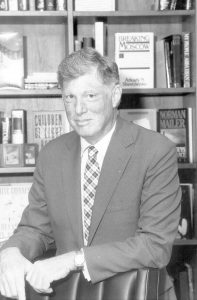Robert L. Bernstein, Publisher and Champion of Dissent, Dies at 96
Source: New York Times / www.nytimes.com / By Robert D. McFadden /
Robert L. Bernstein, who built Random House into an international publishing giant and championed political dissent, freedom of expression and relief for oppressed peoples as the founder of Human Rights Watch, died on Monday in Manhattan. He was 96.

Mr. Bernstein’s son Peter confirmed the death, at a hospital.
The worlds of publishing and human rights frequently overlapped during the Cold War and an era of repressive regimes that censored, imprisoned and exiled dissidents, and Mr. Bernstein — a man of eclectic tastes with a passion for good books and noble causes — resided comfortably in both.
As the head of Random House from 1966 to 1990, he published a host of American authors, including James A. Michener, Toni Morrison, William Styron, Norman Mailer, Gore Vidal, E. L. Doctorow and Robert Ludlum. He also published the Soviet dissidents Andrei D. Sakharov, Yelena G. Bonner and Arkady N. Shevchenko; the Argentine journalist Jacobo Timerman, and the Czech writer-revolutionary Václav Havel.
Random House under Mr. Bernstein, who personally approved all major acquisitions, became the world’s largest publisher of general interest books, known as trade books. Revenues grew from $40 million to $850 million annually, and the flagship acquired many of America’s best-known publishing houses, including the Crown Group, Vintage, Ballantine, Fawcett and Schocken.
Mr. Bernstein hardly looked like one of the most combative and powerful men in the industry. He was a tall, rosy-cheeked patrician with a soft voice and a gentle manner that harmonized with his booklined office and the small gossipy world of publishing luncheons. His Random House, by all accounts, was a collegial, congenial workplace, full of talented, laid-back editors who, like the boss, seemed to be signed on for life.
But in November 1989, after a decade of consolidation and dwindling profits in the publishing industry, Mr. Bernstein was ousted by S.I. Newhouse Jr., whose family owned the publishing empire that had bought Random House in 1980. He was succeeded on Jan. 3, 1990, by Alberto Vitale, the president and chief executive of Bantam Doubleday Dell.
Industry analysts said Mr. Bernstein had been removed because Random House, despite its huge revenue stream, was worried about shrinking profit margins. Mr. Bernstein, the Harvard-educated protégé and successor of Random House’s co-founder Bennett Cerf, did not dispute the analysts. While it was owned by a conglomerate, they said, the company was run like a quirky little bookshop, with a proprietor who loved books, but did not focus on profits. It published many books that had scant commercial prospects, but that were considered important by editors.
In 1991, Mr. Bernstein took the title of publisher at large of John Wiley & Sons. It specialized in professional books, textbooks, technical books and journals. He also devoted far more time to the human rights activities that had increasingly become his second life since the 1970s.
For years he had traveled widely to investigate and expose rights abuses, lobbied governments, raised funds and led fights against the repression of writers in the Soviet Union and other countries. Starting in 1978, he had also founded rights-monitoring groups — Helsinki Watch, Americas Watch, Asia Watch and others — that were merged in 1988 into Human Rights Watch.

